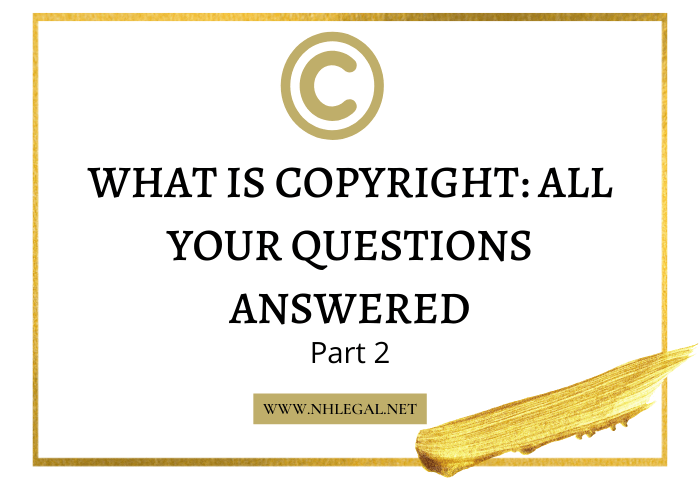Part 2:
Copyright defined as is literally the word itself – “the right to copy”. A person who owns a copyright in a work is the only person who can copy that work or grant permission to someone else to copy it. Copyright is automatically created when a person creates a copyrightable work i.e. if you write an original poem on a piece of paper, you have created a copyrightable work. The first part can be found here.
H. Can a work be granted copyright protection without registration?
Work is under copyright protection the moment it is created and fixed in a tangible form. Registration is voluntary and not a requirement for copyright protection. However, registration is highly recommended.
I. What are the benefits of copyright registration?
Although copyright registration is not mandatory, there are various benefits of doing so:
- Evidence of validity: if the registration is made before or within 5 years of publication, it establishes prima facie evidence of the validity of the copyright and facts stated in the certificate.
- Creates a public record: registration is considered notice to the world of your copyright. This helps people who wish to license your work to verify the status of your work and contact you. Additionally, registration permits you to establish a record with the U.S. Customs and Border Protection for protection against the importation of infringing copies.
- Infringement claim: this is one of the most important and strongest advantages of registering copyrighted work. Registration is a prerequisite for US copyright owners to bring a copyright infringement suit in federal court. As mentioned above, registration acts as evidence of copyright ownership and this makes it easy for you to build a case against any infringing works created by others. It gives you the right to stop others from copying your work or using your work without permission, distributing or making copies of your work without permission. Example: your company’s original creative works such as sales brochures, advertising and promotional materials, videos, instruction manuals, photographs, and website content are protected under copyright law. As a copyright owner, you can stop others (including competitors) from using your copyrighted works or works that are substantially similar to yours.
- Statutory damages and attorneys’ fees: when a registration is made prior to infringement or within 3 months after publication of a work, a copyright owner is eligible for statutory damages, attorneys’ fees, and costs in successful litigation.
J. What does copyright infringement mean?
Copyright infringement occurs when a copyrighted work is distributed, performed, reproduced, publicly displayed, or transformed into a derivative work without the permission of the copyright owner. Basically, engaging in any activity that is covered by one or more of the exclusive rights of a copyright owner (covered above) without authorization of the copyright owner is copyright infringement.
Copyright infringement is determined without regard to the intent of the infringer i.e. it makes no difference whether the infringer knew that their actions constituted infringement.
K. What are the remedies available in a case of copyright infringement?
If infringement is proven in the court, remedies may include the following:
- Injunction – a copyright owner may seek a preliminary or permanent injunction to prevent or restrain future or ongoing infringement.
- Impoundment and Destruction – the court may order impounding of infringing goods and may also order the destruction or any other reasonable disposition of the infringing goods.
- Damages – a copyright owner may be awarded actual damages against the profits of the infringer, or statutory damages (damages determined by the Copyright Act). Actual damages may be awarded in the number of the copyright owner’s losses plus any profits of the infringer earned by the act of infringement. Statutory damages may be awarded in an amount between $200 to $150,000 per work infringed. It is important to note that statutory damages are only available to copyright owners who have registered their copyright prior to the infringement.
- Court costs and Attorney’s fees – courts have the discretion to allow the prevailing party to recover full court costs including reasonable attorney’s fees. However, copyright owners cannot be awarded costs and attorneys’ fees unless they have timely registered their works.
- Criminal Penalties – if an infringement is willful i.e. “for purposes of commercial advantage or private financial gain,” or infringer willingly reproduces or distributes multiple copies with a value of more than $1,000 during a 180-day period, then the infringer may be tried for criminal copyright infringement. If found guilty, the infringer may be imprisoned for up to five years and/or fined up to $250,000.
L. What is a copyright notice?
A copyright notice is a statement placed on copies or phonorecords of a work to inform the public that a copyright owner is claiming ownership of the work. Copyright notice consists of three elements:
- The symbol © or the word “Copyright” or the abbreviation “Copr.”
- The year of first publication of the work
- The name of the copyright owner
Example: © 2020 NH Legal
Please note: for any work published after 1st March 1989, the copyright notice is optional.
Conclusion:
If copyright didn’t exist, everyone would be able to make free copies of each new creative work without the creator’s permission. In such a scenario, creators would not be paid for their works created. The existence of copyright gives creators the right to decide whether their creative works get distributed, and how they get distributed, wherein the creator can make people pay to own copies of their work. Thus, copyright lays down mechanisms for creators to control ownership of their work so they can receive compensation for their works. Moreover, copyright acts as an incentive for creators to continue creating new works.
Author: Krishna Parekh, Law Clerk at NH Legal
L.L.M Candidate at UCLA School of Law, 2020
